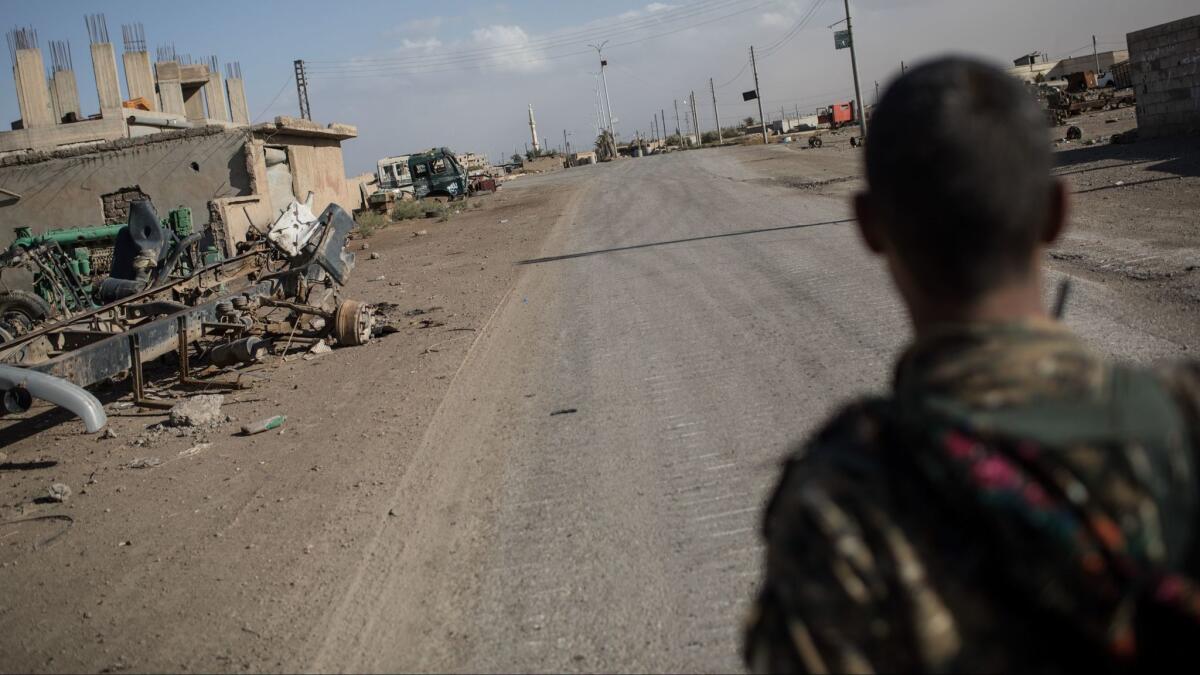Editorial: An American in custody asked to see a lawyer; the military should let him

- Share via
For more than three months, the U.S. military has held an American citizen in secret custody in Iraq — without permitting him to see a lawyer. A federal judge rightly ruled over the weekend that the man, who is suspected of fighting for Islamic State, must be given “immediate” access to a representative of the American Civil Liberties Union.
The Trump administration should stop resisting and let the ACLU in. And it should make it clear to the military that in future cases, a U.S. citizen who asks for a lawyer for a criminal interrogation must receive one.
The unnamed man at the center of the case was born in the U.S. to Saudi parents. In early September, he surrendered to U.S.-backed Syrian Kurdish forces pursuing an offensive against the Islamic State “capital” of Raqqa. He was turned over to U.S. forces, who classified him as an enemy combatant and interrogated him, without a lawyer, in an attempt to obtain intelligence. But a second interrogation for law enforcement purposes never began because the man asked to see a lawyer first.
Despite this clear statement of his intention, the Defense Department has resisted an attempt by the ACLU to talk to the detainee, claiming that the group lacked standing to intervene on his behalf because it hasn’t met with him and doesn’t know if he wants the group to file a habeas corpus petition on his behalf.
A U.S. citizen who asks for a lawyer for a criminal interrogation must receive one.
U.S. District Judge Tanya Chutkan dismissed this ludicrous argument as “disingenuous at best, given that the department is the sole impediment to the [ACLU’s] ability to meet and confer with the detainee.” She also said that she found “remarkable and troubling” the Pentagon’s argument that the man’s request for a lawyer should be ignored until officials can decide what to do with him. A government lawyer acknowledged that one possibility is that the man would be transferred to another country, presumably Saudi Arabia.
Chutkan’s order is only the latest example of the federal judiciary — or, as President Trump might call them, “so-called judges” — acting to ensure that constitutional rights aren’t extinguished as part of the war against terrorism. In 2004, the Supreme Court ruled that a U.S. citizen detained as an enemy combatant was entitled to due process. In the plurality opinion in that case, Justice Sandra Day O’Connor wrote that such a detainee must “be given a meaningful opportunity to contest the factual basis for that detention before a neutral decisionmaker.” Four years later, the court held that even foreign enemy combatants held at Guantanamo could challenge their confinement in federal court, despite attempts by Congress to limit such appeals.
We know that some Americans balk at legal protections of any kind for suspected terrorists, even if they are U.S. citizens. Sometimes Trump seems to be among their number. In November, after the arrest of an alleged Islamic State sympathizer in a terrorist attack in New York, the president said that “these animals … go through court for years” and suggested that the way U.S. courts handled terrorism cases was “a joke and it’s a laughingstock.”
That’s an alternative fact. Actually, civilian courts have proved to be effective — and usually expeditious — in bringing accused terrorists to justice, even during Trump’s administration. But they aren’t and shouldn’t be rubber stamps for the prosecution. In November, a federal jury convicted Ahmed Abu Khattala of several charges connected with the 2012 attack on a U.S. facility in Benghazi, Libya, in which four Americans were killed; but it acquitted him of murder.
International terrorism obviously poses special challenges, including the importance of acquiring intelligence that could prevent future attacks. Even the Obama administration, which emphasized the importance of trying terrorism cases in civilian courts, recognized that Miranda warnings could prevent a suspect from revealing information that might save lives. For example, after Abu Khattala was captured, officials interrogated him without a lawyer for five days on a U.S. Navy warship in search of useful intelligence. Then, after a two-day break, a separate team of FBI interrogators arrived, read him his Miranda rights and started a new line of questioning.
But if officials are going to use “intelligence interrogations” to evade Miranda rules, the courts should step in.
Judicial oversight of the treatment of suspected terrorists, including alleged enemy combatants, is especially vital because of the open-ended nature of the war against terrorism. Unlike President Obama, who at least gave lip service to the idea of having lawmakers define the scope of anti-terrorist activities in the Middle East and Africa, Trump seems to have no interest in the passage of a new congressional “Authorization for Use of Military Force.” The Republican-controlled Congress seems equally uninterested in legislating any time limits on this war.
Again and again, the judicial branch has protected the liberties of U.S. citizens when the other branches were willing to see them eroded. The administration should comply with Chutkan’s ruling and learn from it.
Follow the Opinion section on Twitter @latimesopinion and Facebook
More to Read
A cure for the common opinion
Get thought-provoking perspectives with our weekly newsletter.
You may occasionally receive promotional content from the Los Angeles Times.









